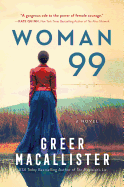
When Charlotte Smith's parents have her sister, Phoebe, committed to Goldengrove Asylum in the dead of night, Charlotte suspects there's something she's not being told. Determined to find--and rescue--her sister from whatever horrors await her there, Charlotte feigns a suicide attempt and gets herself committed. Inside the institution's walls, she discovers firsthand the atrocities of late 19th-century mental health "treatments" for female patients. "I wanted to say that this place made no sense," Charlotte considers not long after her arrival, "but unfortunately, it did. It made a terrible kind of sense... as long as you assumed every woman in the place was mad and that her only worth came from labor or silence, preferably both."
Greer Macallister (The Magician's Lie) notes at the end of Woman 99 that Goldengrove itself is an imaginary place, but the patient treatments she describes were derived from contemporaneous records. This sense of rich historical detail infuses every part of the novel, from Charlotte's dresses to descriptions of San Francisco. Against this backdrop, Charlotte struggles at Goldengrove to shed light on the mistreatment of women at the hands of profit-hungry men; it's impossible not to root for the sisters as they work to combat that mistreatment on behalf of themselves and others. Woman 99 is a fast-paced historical thriller perfect for book club discussions. --Kerry McHugh, blogger at Entomology of a Bookworm

